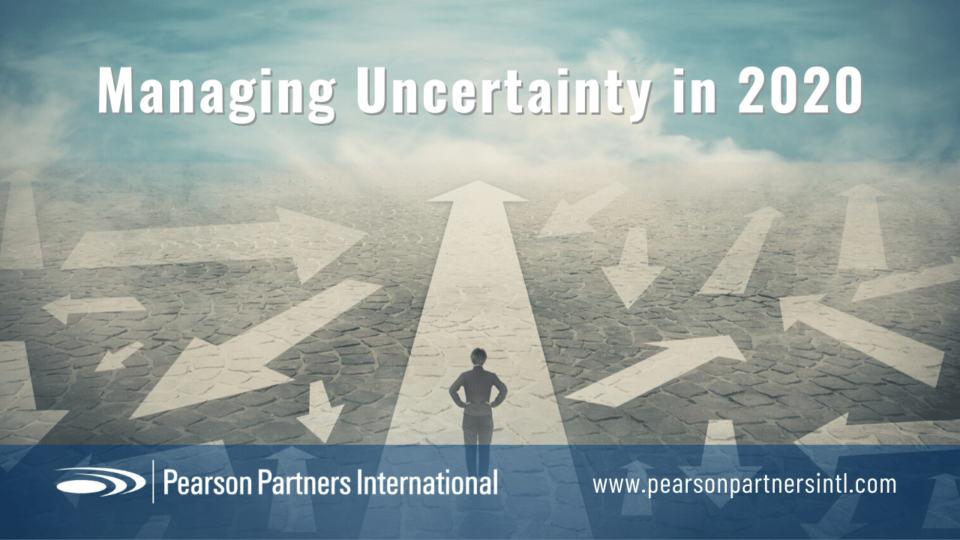Stephen P. Konstans, Senior Vice President & CFO Practice Leader
Five years ago, Pearson Partners wrote an article discussing how organizations can cope with uncertainty. At that time, unstable stock markets, cyber-security threats, the Chinese economic slowdown, natural disasters and sociopolitical strife were among the issues contributing to global uncertainty. Fast forward to 2020, and today’s concerns include a volatile stock market, the COVID-19 pandemic, worldwide economic slowdown, natural disasters, cybersecurity and of course, sociopolitical strife. In the immortal words of Jean-Baptiste Alphonse Karr in 1848, “Plus ça change, plus c’est la même chose.” [The more things change, the more they stay the same.]
Those words were true in 1848, they were true in 2015 and they are true today. Looking back on some of the headlines in 1848, one would have seen articles on the California Gold Rush (finance); the publication of The Communist Manifesto (sociopolitical strife); the Public Health Act in England & Wales, which allowed the construction of sanitary systems (health concerns); war, revolts and protests across the globe (geopolitical uncertainty); and the Great Famine, aka the Irish Potato Famine (natural disaster). So, to those who say we are in a “new normal”, I would humbly suggest that we should study history. Change is a constant. The issues we face today are essentially the same ones that we have always faced, albeit in different forms.
You do not need a crystal ball to predict the future. You just need to be able to think about how these age-old problems will play out in today’s world. So, how should your company cope with uncertainty in 2020? The advice we gave in our 2015 article is still on-point today:
- Identify and prioritize immediate and longer-term risks. Examine these risks and their potential outcomes to your company and develop a risk management plan accordingly.
- Look at the risks and threats facing your customers. Consider how these risks might ultimately affect your organization and include those impacts in your risk management plan.
- Consider forming a dedicated team to focus on innovation and the opportunities created by uncertainty. When global uncertainty is affecting markets, plan for the ways that your organization can benefit.
Here are five additional suggestions:
- Study history. In so doing, you will begin to see trends and patterns that will help you gain insight into how things are likely to unfold as we move forward.
- Understand human nature. This is a corollary to studying history. Human nature doesn’t change. People in 1848 wanted a better life, desired security, and often loved, feared, and even distrusted their leadership.
- Follow political trends. These trends can make or break companies and industries. For example: Will there be a limitation of liability for businesses regarding COVID-19? Will the government force insurance companies to pay certain types of claims? How will the government pay for all of its new spending in response to COVID-19? Thinking through how your company might be affected by these and similar questions can help you to map a way forward.
- Closely watch your competitors. Look at the changes they are (and are not) making. Which of these changes might benefit your company? Keep an open mind about what makes sense and what does not make sense for your organization.
- Keep your eye on emerging trends while keeping one foot firmly planted on the ground. It is important to know what is happening in the world around us, including changes in demographics, preferences, attitudes, etc. However, remember that not all trends play out as initially expected. If that were not the case, workers today would only have to work 20 hours a week, we would be taking summer trips to Mars and people would be living in large underwater colonies—all things that were predicted just a few decades ago. This is not to say that these things can’t or won’t ultimately happen, but you should always ask the relevant questions about how, why, when, who and how much it will cost.
In the throes of the Great Recession, Stephen Covey wrote in his book Predictable Results in Unpredictable Times (FranklinCovey, 2009), “If there’s one thing that’s certain in business, it’s uncertainty.” While it is impossible to control or even identify all risks, it is not impossible to determine risk categories and plan for potential responses to those risks. With a well-executed risk management plan, companies can prepare for, respond to and even shape outcomes of the uncertainties we are facing today and are sure to face in the future.

















